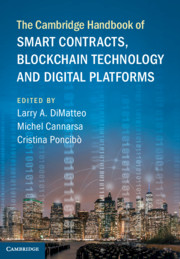Book contents
- The Cambridge Handbook of Smart Contracts, Blockchain Technology and Digital Platforms
- The Cambridge Handbook of Smart Contracts, Blockchain Technology and Digital Platforms
- Copyright page
- Dedication
- Summary of Contents
- Contents
- Contributors
- Preface
- Part I General Framework
- Part II Contract Law and Smart Contracts
- Part III Electronic Platforms and Networks
- Part IV Privacy, Security and Data Protection
- Part V Smart Contracts
- Part VI Future of Smart Contracts, Blockchain and Artificial Intelligence
- 17 Smart Transactional Technologies, Legal Disruption, and the Case of Network Contracts
- 18 Observations on the Impact of Technology on Contract Law
- 19 Visions of Future
19 - Visions of Future
Smart Contracts, Blockchain, and Artificial Intelligence
from Part VI - Future of Smart Contracts, Blockchain and Artificial Intelligence
Published online by Cambridge University Press: 25 October 2019
- The Cambridge Handbook of Smart Contracts, Blockchain Technology and Digital Platforms
- The Cambridge Handbook of Smart Contracts, Blockchain Technology and Digital Platforms
- Copyright page
- Dedication
- Summary of Contents
- Contents
- Contributors
- Preface
- Part I General Framework
- Part II Contract Law and Smart Contracts
- Part III Electronic Platforms and Networks
- Part IV Privacy, Security and Data Protection
- Part V Smart Contracts
- Part VI Future of Smart Contracts, Blockchain and Artificial Intelligence
- 17 Smart Transactional Technologies, Legal Disruption, and the Case of Network Contracts
- 18 Observations on the Impact of Technology on Contract Law
- 19 Visions of Future
Summary
Code is not the law. It is used to program the architecture of new (social) objects, such as the smart contracts placed on a blockchain. On the other hand, law is not the code. Both can be conceived as regulatory tools; however, law and codes operate through different modalities. Law will continue to reign supreme, but it should also use its force to require technology to self-regulate following certain principles.Examines the challenge of future technologies, such as advanced Artificial Intelligence (AI), to the way society is structured and the role of democratic government as both legislator and the guardian of the rule of law.
- Type
- Chapter
- Information
- The Cambridge Handbook of Smart Contracts, Blockchain Technology and Digital Platforms , pp. 359 - 366Publisher: Cambridge University PressPrint publication year: 2019
- 2
- Cited by

